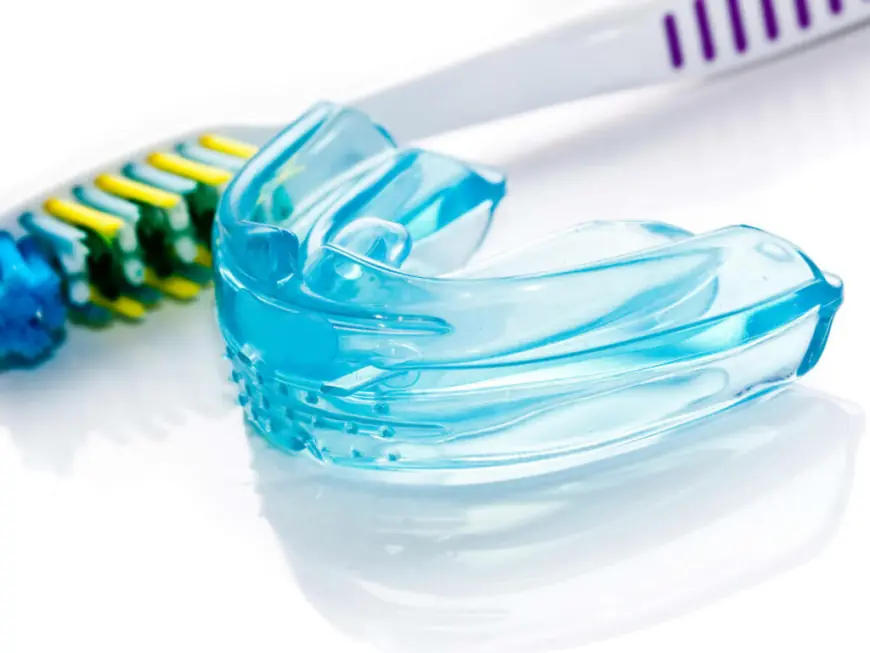Can a Mouthguard Help You Sleep Better? Exploring the Link
Mouthguard

Sleep is a cornerstone of overall well-being, yet millions struggle to achieve restful, uninterrupted sleep due to jaw tension, teeth grinding, or sleep apnea. Surprisingly, one small device—a mouthguard—may hold the key to better nights and more energized mornings. As awareness of this simple solution grows, demand for mouthguards in Dubai has surged, with more dental clinics offering customized options aimed not just at protection, but improved sleep quality. So, how exactly can a mouthguard help you sleep better?
Understanding Sleep Disruptions Caused by Oral Conditions:
Many people experience disrupted sleep due to unconscious clenching, grinding (bruxism), or airway obstruction. These conditions often go unnoticed but can have a major impact on the depth and duration of sleep.
-
Bruxism causes micro-arousals throughout the night, reducing sleep quality.
-
Jaw clenching can lead to muscle tension and headaches that disturb rest.
-
Obstructive sleep apnea (OSA) affects oxygen levels and sleep cycles.
-
Snoring may also result from poor jaw positioning, reducing sleep quality for both the sufferer and their partner.
-
Dental pain or tension in the temporomandibular joint (TMJ) can cause nighttime discomfort.
Treating these underlying issues with a mouthguard may offer significant improvements in sleep quality.
How Mouthguards Promote Better Sleep:
Mouthguards help align the jaw and reduce pressure on muscles, joints, and teeth. For those with mild sleep apnea or bruxism, this alignment and cushioning can lead to fewer disturbances and deeper sleep.
-
Reduce nighttime grinding, preventing tension-related waking.
-
Prevent clenching, lowering jaw and facial pain that can disturb sleep.
-
Encourage open airway posture, minimizing snoring and shallow breathing.
-
Improve muscle relaxation, especially in the jaw and neck.
-
Lead to longer, uninterrupted sleep cycles as a result of reduced discomfort.
These small but cumulative changes can help you wake up feeling more rested and refreshed.
Who Might Benefit From a Sleep Mouthguard:
Not everyone needs a night guard, but for some, it can be life-changing. Understanding whether you fall into one of the high-risk categories is the first step.
-
People who grind or clench their teeth during sleep (bruxism).
-
Individuals with mild to moderate sleep apnea, especially those who can’t tolerate CPAP machines.
-
Frequent snorers, particularly those disturbed by their own snoring.
-
Those experiencing jaw tension or TMJ disorders affecting sleep.
-
Athletes or highly stressed individuals, who often clench unknowingly.
If you suspect any of these issues, consulting a dentist or sleep specialist can help determine whether a mouthguard is suitable for your needs.
Custom vs. Store-Bought: What to Choose for Better Sleep:
While over-the-counter mouthguards offer convenience, they often fall short in providing the comfort and precise fit needed for effective nighttime use. Custom guards are superior in both design and performance.
-
Store-bought guards may feel bulky or cause misalignment.
-
Boil-and-bite models offer a semi-custom fit but wear out quickly.
-
Custom-fitted guards are designed based on your exact dental structure.
-
Professionally made mouthguards are more durable and comfortable for long-term use.
-
Clinics providing mouthguards in Dubai often use digital scans for perfect accuracy.
Comfort is crucial for compliance—if the guard is uncomfortable, you won’t wear it consistently.
Additional Health Benefits of Sleep Mouthguards:
Beyond improving sleep quality, using a mouthguard may provide a range of other health-related benefits by addressing oral and muscular issues that contribute to poor rest.
-
Reduces stress on teeth, lowering the risk of fractures and enamel erosion.
-
Protects dental work, including crowns, bridges, and veneers.
-
Relieves facial tension, which can help reduce headaches and migraines.
-
Improves breathing patterns, especially in those with airway restriction.
-
Enhances overall mood and energy levels, thanks to better sleep.
These benefits make mouthguards a valuable component of both dental and general wellness.
Maintenance and Care for Long-Term Effectiveness:
A well-maintained mouthguard can last years and continue providing benefits. Like any oral appliance, however, it requires regular cleaning and monitoring for wear.
-
Rinse the guard after each use to remove saliva and bacteria.
-
Clean weekly with a soft toothbrush and non-abrasive cleanser.
-
Store in a ventilated case to prevent bacterial buildup.
-
Avoid hot water, which can warp the shape of the guard.
-
Replace every 1–3 years, depending on material and usage.
Good hygiene ensures that your sleep aid remains both effective and safe.
Final Thoughts:
If you’re struggling to get quality sleep and waking up feeling tired, a custom-fit mouthguard might be the overlooked solution you need. Whether it’s bruxism, TMJ tension, or mild sleep apnea, oral conditions often sabotage sleep in subtle but serious ways. By addressing the root causes of jaw-related sleep issues, mouthguards can help you achieve deeper, more restorative rest. More clinics now offer customized mouthguards in Dubai, giving residents access to a safe, non-invasive tool for better nights and healthier mornings. Investing in your sleep is one of the most impactful choices you can make—and it might just start with your mouth.
What's Your Reaction?
 Like
0
Like
0
 Dislike
0
Dislike
0
 Love
0
Love
0
 Funny
0
Funny
0
 Angry
0
Angry
0
 Sad
0
Sad
0
 Wow
0
Wow
0















































